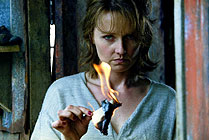|
|
|
|
Perfect
Strangers
|
 |
|
Commenting on a scene in Sam Neill's documentary on New Zealand film, Cinema of Unease (1995), the critic Philip Matthews remarked in the journal Landfall: "Neill was surely right to rush past the madhouse, rather than the haunted house or the graveyard", because in New Zealand films "monsters are humans – damaged, homicidal, psychotic." There is indeed a rich tradition of New Zealand Gothic which bridges horror stories, mystery-thrillers, art movies like Jane Campion's The Piano (1993) and short experimental pieces like Alison Maclean's Kitchen Sink (1989) – shot through with black humour and a misanthropic sense of the fundamental amorality of human behaviour. It is into these dark, ironic waters that Perfect Strangers proudly swims. Its writer-director, Gaylene Preston, was there at the start of the Gothic trend with her intriguing feature Mr Wrong in 1984. And even earlier, in the magazine Alternative Cinema, Preston, Maclean and Campion were all figuring out how to relate their feminism to their love of popular fiction. Perfect Strangers is another parable of a woman bumping into Mr Wrong. Melanie (Rachael Blake) is swiftly established in the early scenes as a feisty but frustrated person, open to the temptation offered by the seductive figure known only as The Man (Sam Neill). Hardly twenty minutes has gone by before Melanie is screaming for her freedom as The Man powers his boat towards his secluded island mansion. At this moment, many viewers will wonder: hasn't this story just squandered its central Gothic ambiguity, the possibility that this woman really might desire what most threatens her? But Preston has other plans for these characters that go beyond the thriller genre. Perfect Strangers does not come with a Japanese Story-style embargo on disclosing its central plot move. But maybe it should. Suffice to say, what begins as a Sleeping with the Enemy-style romance-thriller evolves into a sometimes gruesome fantasy reminiscent of Roman Polanski's more surreal efforts. In this scenario, the power play of man and woman unfolds between reality and fantasy, in a dance of shifting identities. Perfect Strangers is an uneven achievement. It is full of terrific ideas and felicitous stylistic touches, but it never becomes a whole piece. Whenever the film hits a new plateau, it tends to sit there for too long. One longs for more twists, deeper complications, an ever-greater flight of the imagination. Nonetheless, the film makes a fascinating double with Campion's contemporaneous erotic thriller, In the Cut (2003). In both films, it's hard to tell a woman's libido from her Freudian death-drive – and even harder to decide whether the average guy is a super lover, a serial killer, or just a big, helpless kid. © Adrian Martin October 2003 |
![]()